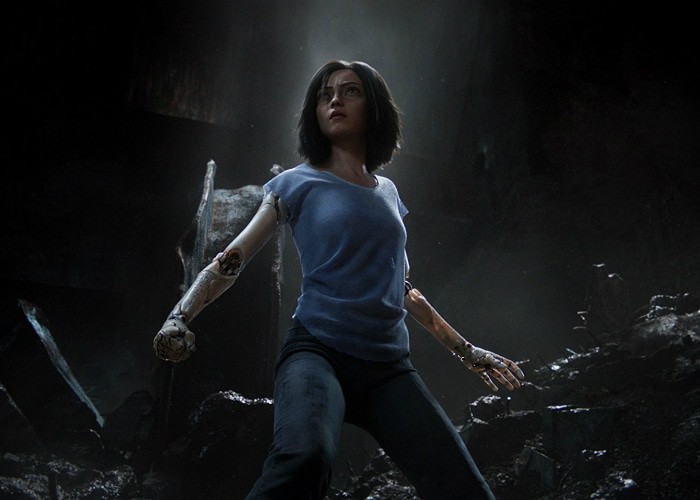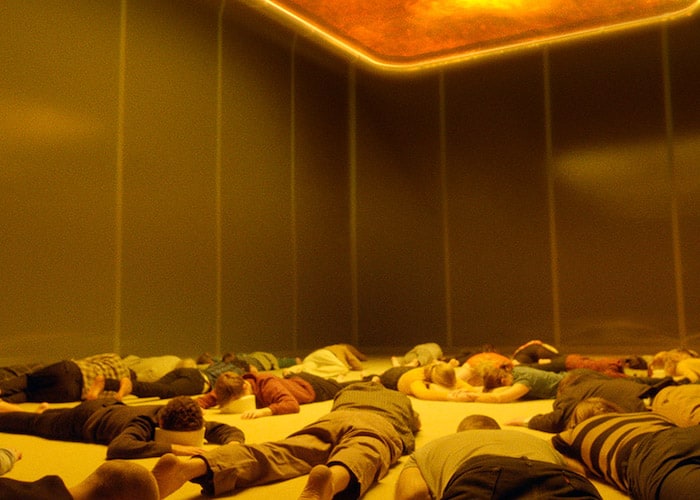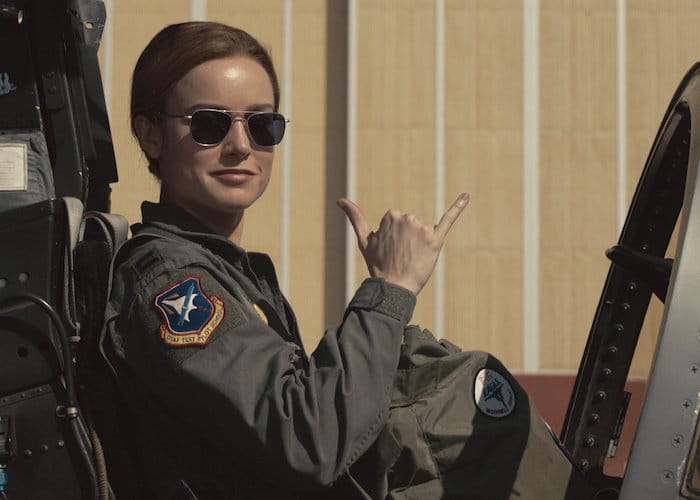For more in this series, check out our Mid-Year Report archives.
Whether it’s to escape from our problems or better understand them, we need speculative fiction more than ever these days. But so far, 2019 hasn’t been delivering on the former. Not only are we midway through the year, but as of the end of June, we’re also basically midway through the summer, the season of blockbuster entertainment that’s traditionally mindless yet still often satisfyingly well-made. Yes, there have been a few good superhero movies this year, but outside of the dependable from Marvel and the surprising from DC, the science fiction and fantasy movies that have resonated thus far have been mostly smaller and/or less successful releases taking us deep into space or far into the future.
Keep reading for a look at 2019’s best sci-fi and fantasy movies so far.
Alita: Battle Angel

More than 15 years in the making, James Cameron’s pet project, which wound up being helmed by Robert Rodriguez, might have been a perfect alternative to all the underwhelming sequels had it been held for this summer. Instead, US audiences mostly ignored the manga adaption when it released inexplicably on Valentine’s Day. There’s no denying Alita: Battle Angel has issues, especially script-wise; Cameron productions often do. But as far as spectacle tailor-made for the theatrical experience, there hasn’t been much better this decade, let alone this year. And yes, I’m talking 3D-worthy, the most impressive since Cameron’s own Avatar 10 years ago.
The worldbuilding is visually (if not logically) magnificent. The action is stupendously well-directed. And at its center, behind some occasionally questionable execution from the story and effects teams, Rosa Salazar gives a phenomenal captured performance that’s energetic and endearing as the titular cyborg finding her way through a 26th-century dystopia full of hunter-warriors, literal overlords, and a thrilling sport called Motorball. Thanks to foreign markets, Alita is one of the top-grossing movies of 2019 worldwide, despite disappointing domestically, so hopefully, the teased sequel will still happen.
Pre-order the movie from Amazon
Aniara

While some foreign countries are making waves with big science fiction blockbusters that look expensive and are sufficiently engrossing, Sweden has come through with something more intriguing yet still awe-inspiring. Pella Kågerman and Hugo Lilja’s Aniara is not heady sci-fi, just clever and contemplative, ultimately ironic even. Based on Harry Martinson’s epic existential sci-fi poem, itself the pride of Sweden, the film follows a colonial transport ship that loses power and goes off course, drifting through space possibly forever. It’s like a better, more populous Passengers. Actually, forget I brought up that movie. Essentially, it’s Gilligan’s Island with less goofiness, more despair. Also, orgies.
Emelie Jonsson is fabulous in the lead, playing all the stages of adjustment to a crisis as an employee of the ship who operates a form of VR escapist attraction for its passengers until even that resource has been depleted. While never as deep nor lyrical nor scientifically motivated as the source material and not even as curiously or brutally bleak as another title on this list about a one-way interstellar “sarcophagus,” Aniara is a smorgasbord of a film, spanning many eras in its depiction of life on an aimless ark. And kudos to its LGBT representation being so normalized and not relevant to the plot. Between this and its co-production of 2011’s Melancholia, Sweden might just be the best place to find profound sci-fi disaster movies.
Avengers: Endgame

Last year, Avengers: Infinity War just barely made my list of the best sci-fi and fantasy movies of 2018. And in a tie with Aquaman. When ranked rather than alphabetized, Avengers: Endgame will certainly fare much better. Like Infinity War, it’s a whole lot of movie. It also feels like a series finale for a decade-long TV show that just happened to play out on the big screen over 22 super-sized episodes. To that, it’s a surprisingly satisfying conclusion, wrapping up multiple character arcs and plotlines, including some we didn’t even realize needed such focus — this is, unexpectedly, Nebula’s movie as much as it is Iron Man or Captain America’s.
How and where Endgame will place down the road, both within the Marvel Cinematic Universe and against other comic book and superhero movies overall, is unclear. The Avengers sequel is hardly able to exist on its own. For this year, though, the experience of sitting through its three hours, divided into the three acts of serious drama in melancholic mourning, fun adventures with time-travel fan service, and an overpopulated yet thrilling splash-page of a climax, especially as a follow-up to the messy misery of Infinity War, was outstanding.
See the movie in theaters now
Captain Marvel

As substantial as Avengers: Endgame was (and maybe is), its MCU predecessor proved to be anything but. Narratively, that is. Outside of the screen, it was a momentous occasion, more so for the billion-dollar-grossing ceiling broken by a woman director (co-helmer Anna Boden) than the fact that Marvel Studios finally delivered a movie with a female lead with its 21st franchise installment. On the screen, it’s a fine standalone tale of a superwoman learning not to hold anything back, presented alongside a Nick Fury origin story plus a showcase for a scene-stealing alien cat. Also, tons of ’90s nostalgia.
Aside from all the references to that decade, the movie also earns marks for feeling like something of a mashup of ’90s action cinema and that era’s indie spirit. It looks like a Marvel movie made by filmmakers who came out of Sundance, and with regular MCU DP Ben Davis, they gave us some of our favorite shots of the year so far. Meanwhile, their screenplay, written with Geneva Robertson-Dworet, subverts expectations whether you’re a comic book expert or casual superhero movie fan, and gives us phenomenal female bonding moments. It could have used more personality, but here’s hoping there will be growth throughout multiple sequels.
Fast Color

Since the rise of the superhero movie genre as a dominant presence in cinema, plenty of storytellers have explored the idea of what it would be like if costumed crusaders or people with special abilities existed in the real world. Julia Hart’s Fast Color is probably the closest thing to a correct answer. The small, stiff, slow film makes even the similarly plotted Midnight Special look like an epic action spectacular. Gugu Mbatha-Raw takes the lead as a woman on the run from government agents and scientists. She heads back home to reconnect with her mother and the daughter she abandoned years ago.
They have abilities, too. And the effects involved in their powers are very cool and beautiful. Yet this isn’t a film to watch for dazzling magic or astonishing feats or heroes saving the day. Fast Color is mainly a drama about three generations of women who’ve inherited gifts that go back through their family for centuries. They mainly involve breaking things apart and putting them back together, metaphorically reminding me of The Brother from Another Planet (which also happens to co-star David Strathairn). This, too, is a little film with big ideas executed tremendously.
The post The Best Sci-Fi and Fantasy Movies of 2019 So Far appeared first on Film School Rejects.
from RSSMix.com Mix ID 8320810 https://ift.tt/2J7p5FG

No comments:
Post a Comment